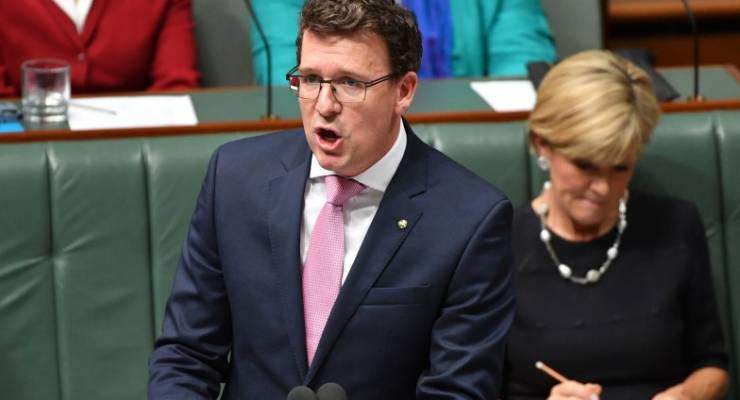
The Coalition’s Centrelink robo-debt scheme has been absolutely riddled with controversies — from the initial shadiness of a debt system relying on historical payment and tax records, all the way to recent reports of tax returns being seized from people challenging their debts.
How is it that the Coalition can continue to justify the scheme with anything resembling a straight face? Poring over the government’s excuses, Crikey discovered the evolution of these excuses almost perfectly mirrors the (alleged) stages of grief.
Denial
I’m not aware of individuals who are completely convinced that they don’t owe money but have been given a debt notice. Former human services minister Alan Tudge, January 2017
This is not a matter for apology.Former social services minister Christian Porter, June 2017
Unsurprisingly, denial runs strongest throughout government responses to the robo-debt scandals. This was seen most strongly six months after the introduction of the system, when it was revealed that the number of notices of debt had blossomed to 169,000. (They averaged 20,000 per year under the former, manual oversight system).
During the ensuing surge of public criticism, we saw Tudge deny that people without debts were being affected, and Porter deny the system was flawed following an overwhelmingly negative Senate inquiry. Porter also denied that the letters were technically “debt letters”, despite the ensuing debt-recovery process.
Former attorney-general George Brandis would try to tell the ABC’s Q&A that any false letters could be challenged with a quick call to Centrelink — a denial of the reality faced by welfare recipients, who know there is no such thing as a “quick” call to Centrelink.
Anger
In cases where people have gone to the media, with statements that are incorrect or misleading … we are able to, under the Social Services Act, release information about the person for the purpose of, as I quote, ‘correcting a mistake of fact, a misleading perception or impression, or a misleading statement’. Tudge, February 2017
The government’s defensive, denialist attitude quickly escalated at the seven-month mark when writer Andie Fox, who had written about being chased by Centrelink for a debt she didn’t owe, had her personal information leaked by the Department of Human Services to The Canberra Times.
Tudge was later referred to the Australian Federal Police over the incident, but was cleared by privacy commissioner Angelene Falk — establishing the fairly horrifying precedent that insulting the government can legally lead to public shaming.
Bargaining
In wiping her debt, Centrelink is admitting that they got it wrong and is essentially trying to avoid scrutiny as a result. ACOSS chief executive Cassandra Goldie, May 2019.
While Crikey stresses that there is no actual bargaining involved here, the government has shown some flexibility on the issue of contested debt in the case of Melbourne nurse Madeleine Masterton. After Masterson and Victoria Legal Aid launched a Federal Court challenge to her $4000 debt in February this year, Human Services responded by wiping it.
Masterton would still proceed with the case, while VLA had no trouble finding a second test case.
Sadness
I think what we underestimated was how many people would not clarify, and would not engage, and so I think if I was to sum up what the problem has been it is that, when we wrote those initial letters, that recipients and former recipients didn’t engage. Human services secretary Kathryn Campbell, March 2017
Eight months after the introduction of robo-debt, we got the first Senate inquiry into the scheme and the first example of the government equivalent of sadness: self-pity.
Much like Porter’s denial of the system’s flaws, human services secretary Kathryn Campbell would put the blame of debts issued to vacant houses — an error largely born from Centrelink’s historic database — squarely at the feet of the intended recipients.
The federal government would ultimately ignore the inquiry’s recommendation to suspend robo-debt.
Acceptance
In this particular case, because of the size of the debt being both uneconomical to recover as well as the length of time, the department should have simply waived the debt. They didn’t, my department was wrong, I apologise for it. Government services minister Stuart Robert, July 2019
In July, Government Services Minister Stuart Robert conceded that attempting to recover a debt from a deceased disability pensioner was maybe a step too far. But just as Masterton would later get government lawyers to concede her debt was “wrong”, these are only isolated admissions. The Coalition, it seems, is able to accept that the system can be flawed. It’s just not going to do anything about that, other than occasionally apologise for certain cases.








The objective of the robodebt system is to deter people from seeking social service benefits. Any injustices it creates are not system failures, they are design features.
The LNP proudly marches backwards, kicking the unfortunate viciously as it goes.
Mob of proper arseholes.
It surely was a copy of the well known scam of false billing but with the added threat of government power – it that isn’t demanding money with menaces I don’t know what is.
I don’t know quite how the legalities work but elsewhere billing someone without any itemisation would be prima facie demand with menace or an attempt to gain financial advantage by deception.
It’s quite wrong to suggest the system is broken. It’s clearly set up this way in a deliberately fraudulent manner. Most benefits eligibility are calculated by recipient fortnightly income or some other short period. It’s not at all hard to see that this may vary a lot in a financial year. A person may be completely unemployed and earning no other income for say three months. Then they get a regular full time job for six months, lose that job and are working one day a week still qualifying for a part dole payment. Their total year earnings look way above dole eligibility if you just divide the total by 26 fortnights.
Where are the records these departments must have ? How hard is it to program a spreadsheet that calculates it properly ? Why haven’t I seen anyone ask these two most basic questions ?
Why have no “altruistic lawyers” (contradiction in terms, I know) fallen over themselves to take up this issue pro bono?
It’s almost as if they are all just ambulance chasing shysters, Heaven Forfend.